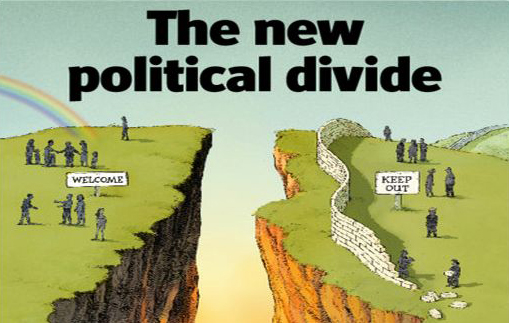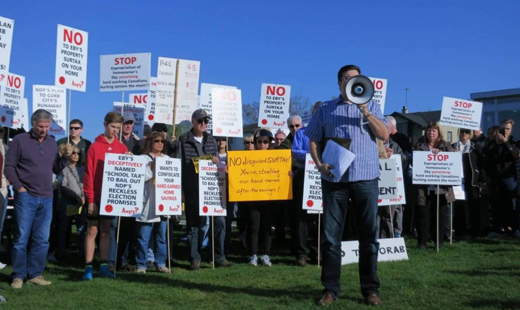
In the age of Trump, a great chasm has opened on our political landscape, one that — despite the best of intentions — may not be able to be bridged.
On the one side, you have that portion of Vancouver’s population who reside in multi-million dollar homes located predominantly in Yaletown and southeast False Creek, West Point Grey, Dunbar, Kerrisdale and Shaughnessy, whose populations turn out in droves — up to 85% of residents in these neighbourhoods arriving at their local pollings station on election day to cast their ballot — to vote for the Vancouver Non-Partisan Association, the corporately-funded-and-backed municipal political party that has, for generations, protected their class and economic interests.

These are the folks — pictured above — who rallied last week at West Point Grey’s Trimble Park to oppose a move by the BC NDP government to impose a school surtax on homes worth more than $3 million, a newly-created tax that would see a westside homeowner who owns an $8-million home paying an extra $18,000 in property taxes, annually, to the province.
The mainly westside residents think it unfair, after decades of right-of-centre B.C. Liberal / Socred provincial governments, and the right-of-centre Vancouver Non-Partisan Association pulling the levers of civic government, that new wealth taxes be imposed on them so that government can better fund our public education system (from which the B.C. Liberal government cut $58.3 million in funding in Vancouver each year from 2002 to 2015), build affordable homes to house the 50% of seniors in our city living on less than $26,000 a year, the construction of affordable housing, and provision of funding for the one in five children in Vancouver who live in poverty.
In order words, these are the Darwinian “I’m all right, Jack, you make out of life what you put into it, I’m not responsible for you” folks. Nice.

On the other side of this great political chasm, you have folks like United Church Minister and current OneCity Vancouver candidate for Vancouver City Council, Christine Boyle — and her progressively-minded colleagues in OneCity, Vision Vancouver, COPE, the Greens and TeamJean, the latter of which group’s core organizing philosophy revolves around “building the city we need”, a fairer, more inclusive and more just city for all of us, whether we live in the sometimes blighted Downtown Eastside neighbourhood where residents have come together in solidarity to build a vibrant community of the caring and compassionate, or Strathcona, Hastings Sunrise, Riley Park, Grandview Woodland, and any one of Vancouver’s 23 diverse neighbourhoods where housing is acknowledged as a right, and where the elimination of poverty and wont is a central operating principle of the five progressive parties offering candidates in the upcoming civic election.
The latter grouping of political parties have reached out a hand to those in our community who have been deemed to be “wealthy”, by dint of income or housing status, have attempted to bridge the political divide, thus far to no good effect. All of this is not to say, either, that there are not many good persons of conscience resident in Yaletown, West Point Grey, Dunbar, Kerrisdale and Shaughnessy who are at present, and as has been the case for some while now, working with their neighbours & with civic parties like OneCity Vancouver in common cause to acknowledge that Vancouver is, indeed, one city, comprised of diverse peoples from every socio-economic strata and circumstance, who live together in the village that is Vancouver, where we are — each and every one of us — responsible for one another.
For as President-elect John Fitzgerald Kennedy stated in an address (abridged) to the Massachusetts legislature, on January 9th, 1961 …
For those to whom much is given, much is required. And when at some future date the high court of history sits in judgment on each of us — recording whether in our brief span of service we fulfilled our responsibilities to the state — our success or failure, in whatever office we hold, will be measured by the answers to four questions:
First, were we courageous, possessed of the courage to stand up to our adversaries, to stand up when necessary, to resist public pressure, when such pressure does not serve the common good?
Secondly, were we possessed of good judgment — with perceptive judgment of the future as well as the past — of our mistakes as well as the mistakes of others — with enough wisdom to know what we did not know and enough candour to admit it?
Third, were we possessed of integrity, who never ran out on either the principles in which we believed or the public who believed in us — women and men whom neither financial gain nor political ambition could ever divert from the fulfillment of our sacred trust?
Finally, were we truly women and men of dedication — with an honour mortgaged to no single individual or group, and comprised of no private obligation or aim, but devoted solely to serving the public good? Courage — judgment — integrity — dedication — these are the historic qualities which must characterize the conduct of governance, in every city and in every region of our fair nation, in the four turbulent years that lie ahead.
And so it is. The divide in our city must be bridged, if at all possible, in the current civic election cycle, by the political figures who would seek to govern our city over the next four years, beginning in November of this year, each of whom must be governed by the notion of implementing legislation and policies based on what is best for all, and not one particular interest group — which for too long has been the overriding foundation of government in our province and, far too often, in our city.

We must together realize that, in principle and in fact, we are our brothers and sisters keepers, that collectively we have an obligation to one another, and that as has been stated: to whom much is given, much is expected.
In the coming election, let us all come together as one, let us bridge the chasm that would seem to divide us, let us work together to ensure that modular housing is built in neighbourhoods across our city (let’s make sure, too, that there is adequate, respectful, information-filled, and inclusive consultation with residents in neighbourhoods, as a pre-condition to the taking of decisions to construct that housing).
And, that new and truly affordable housing co-ops are constructed on city land, as homes for families across all of Vancouver’s 23 neighbourhoods; that Vancouver City Council work with the provincial government to ensure supportive social housing is built, opened and properly and humanely administered in the housing of those in need; that the tax structure at City Hall for small business, which is such a burden for small business operators, is moved to the multi-national companies in our town, who pay woefully less in business tax than is fair and proper — in the process, this transfer of tax responsibility to “big business” relieving the beleaguered home owner of the burden of annual titanic property tax increases; and that Vancouver continue to move forward as we’ve written previously, and will continue to write, to become a city defined by inclusion, social justice, and a city that truly serves the needs of all of Vancouver’s diverse citizenry.